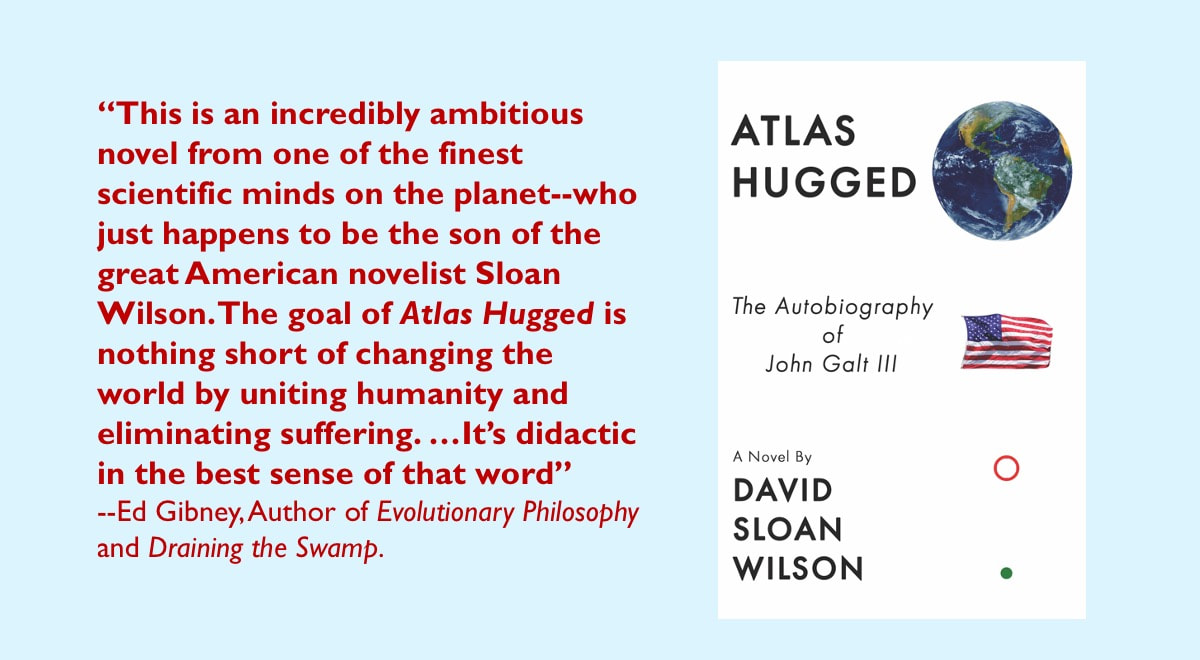But then — as I noted in my post about Rand during my series on the Survival of the Fittest Philosophers (where she came #52 out of 60) — I read more. Quite a lot more. I became More Objective Than An Objectivist and I saw through it all. What did I see exactly? I said:
"You had to take electives with a dozen crunchy granola types to learn about limits to growth and The Ecology of Commerce. You had to seek out indie documentaries about The Corporation to see why its behaviour mimicked those of psychopaths. You had to go visit small, local businesses to find Companies that Choose to Be Great Instead of Big. You had to read about The Jungle of unbridled capitalism at the turn of the 20th century that literally ground immigrants into dust. You had to listen to Joel Salatin talk about how faster, fatter, bigger, cheaper, was a poor food product of our mechanistic, Greco-Roman, western, reductionist, linear, fragmented, compartmentalised, disconnected, democratised, individualised, parts-oriented thought process. And you had to read much more about evolution and biology to see the immense picture of life that truly selfish businessmen are only just a tiny virus within. Once I did all that, though, Rand's rational self-interest became the most irrational thing I had heard. Now when I read her thoughts on capitalism and ethics, she sounds like a two year old throwing a temper tantrum. Me, me, me, me!"
I became so disenchanted with Rand that arguing against her became a central theme of my fist novel. Even the Kirkus Review of Draining the Swamp noticed. They called my book, "A philosophically charged critique of government, couched in the form of a novel." And they noted:
This novel doubles as a sort of American civics textbook, explaining the functions of each agency while adding the spice of insider knowledge. It’s bookended with references to Ayn Rand’s brand of libertarianism, which provides philosophical power to the concluding moral.
Earlier this year, I got into a private conversation with the famous David Sloan Wilson about evolutionary epistemology (more on that soon!) and he asked me about my background. I said:
My favorite novels come from authors with a strong philosophical element in their work like Dostoyevsky, Sartre, Camus, Rebecca Newberger Goldstein, and Irvin Yalom. I’ve also been very inspired by science writers like Carl Sagan, Richard Dawkins, E.O. Wilson, and of course yourself. Together, these built dreams for me of writing fiction and philosophy in the influential combination that Ayn Rand achieved, but instead of championing selfishness as she did, I feel much more inspired to explore the prosocial stories that are actually successful in evolution.
I didn't know it at the time, but David was just about to release his very first novel, which also happened to have the same inspiration. His book was written as a sequel and antidote to Ayn Rand’s iconic novel Atlas Shrugged, but it was going to be called Atlas Hugged instead. When he saw what I said about my own writing, he let me have an advance copy of his book. And boy is it good! I would definitely add it to the list above of things to read if you want to see through the childish brand of Rand-ian selfishness that has infected so much of America and the world.
I sent David a short review after I finished reading Atlas Hugged, and I'm flattered that he's turned it into a feature blurb on his website. (My first blurb!) He even created this marketing picture, which has been shared on Twitter (with the likes of Dan Dennett, Richard Dawkins, Sam Harris, Barbara Ehrenreich, and Barbara King no less!):

This is an incredibly ambitious novel from one of the finest scientific minds on the planet (who just happens to be the son of a great American novelist too). The goal of Atlas Hugged is nothing short of changing the world by uniting humanity and eliminating suffering. As a reimagined sequel of sorts to Ayn Rand’s famous and influential novel Atlas Shrugged, Wilson’s work is similarly full of philosophical ideas and illustrative parables. It’s didactic in the best sense of that word since it comes from a very fine professor who has clearly honed his teaching over decades of lecturing. In Atlas Hugged, Wilson extols the virtues of cooperation rather than the selfishness that Rand did, and for that alone he ought to be cheered on. Even if you don’t agree with everything Wilson asserts, there is so much to chew on and learn from (in a very easily digested format) that Atlas Hugged deserves a wide readership—certainly wider than the shrug Ayn Rand gave us.
—Ed Gibney, Author and Evolutionary Philosopher

